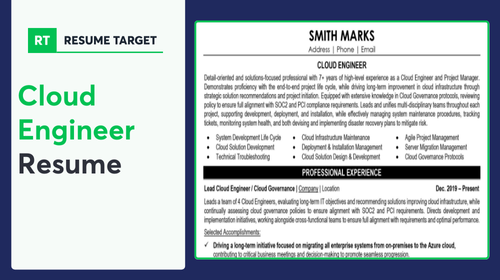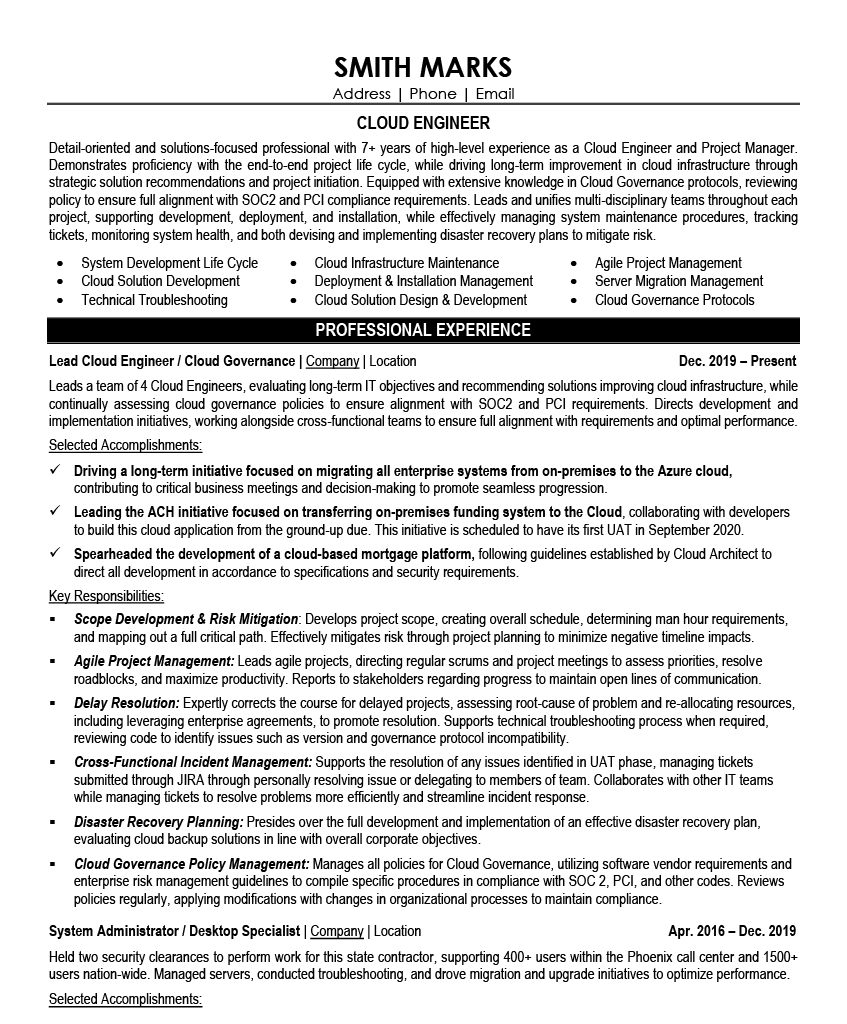

In the fast-moving world of cloud technology, your resume can become outdated faster than a deprecated API. Even skilled cloud engineers struggle to showcase their complex technical abilities on paper.
Are you finding it challenging to translate your cloud architecture expertise into compelling resume content? Your resume needs to speak both tech and business language while highlighting your ability to drive cloud transformation and efficiency.
Resume Target specializes in helping cloud engineers showcase their technical prowess and business impact. We'll help you craft a resume that demonstrates your cloud expertise, infrastructure management skills, and proven track record of delivering scalable solutions.


In today's digital landscape, cloud engineers are the architects of the invisible infrastructure that powers our connected world, helping organizations manage their cloud-based applications while minimizing local storage requirements.
As a cloud engineer, you'll orchestrate the complex dance of data across virtual networks, create scalable solutions for businesses, and ensure that critical applications remain accessible and secure in the cloud environment, whether you're specializing in cloud networking, security, or software development.
The path to becoming a cloud engineer offers diverse opportunities for growth, with various specializations to explore and certifications to pursue as you advance from handling basic cloud services to designing enterprise-level cloud architectures that transform how businesses operate.
Let's talk about what's exciting in the Cloud Engineering field - your earning potential is truly impressive! As companies continue expanding their cloud infrastructure, they're offering compelling compensation packages to attract talented professionals like you. And guess what? Your earning power grows significantly as you gain expertise and specialize.
Figures from: Western Governors University
Cloud engineering offers a dynamic career path with opportunities to grow from junior positions to leadership roles. As you gain expertise in cloud technologies and architecture, you can advance to senior positions like Cloud Architect or DevOps Manager.
To accelerate your cloud engineering career, you'll need to master both technical expertise and leadership capabilities that go beyond basic cloud platform knowledge.
- Cloud Architecture Design - DevOps and Automation - Multi-cloud Platform Management - Strategic CommunicationBreaking into cloud engineering is achievable through entry-level IT roles, certifications, and hands-on experience with major platforms like AWS, Azure, or Google Cloud.
To build your career path to cloud engineering, you'll need to master essential technical competencies including virtualization, DevOps, networking, containerization, and scalability while progressing through foundational roles.
• Junior System Administrator • Help Desk Technician • Junior Network Engineer • Cloud Support Associate • Junior DevOps Engineer • Cloud Operations Analyst These roles provide stepping stones to gain: • Hands-on infrastructure experience • Understanding of cloud platforms • Knowledge of security protocols • Experience with automation tools • Exposure to enterprise environmentsRequirements from Splunk
From tech hubs to financial centers, cloud engineering roles are booming across industries and major metro areas.
Figures from UpGrad
Struggling to translate your cloud infrastructure expertise, deployment achievements, and technical skills into a compelling resume that catches a hiring manager's attention? This comprehensive, section-by-section guide will show you exactly how to build a professional cloud engineer resume that highlights your most impressive accomplishments.
As a Cloud Engineer, condensing years of complex infrastructure experience and technical expertise into a few powerful sentences can feel as challenging as migrating an entire legacy system to the cloud.
While you excel at architecting scalable solutions and optimizing cloud resources, translating your impressive technical achievements into compelling business value for hiring managers requires a different kind of architecture - one that showcases both your technical prowess and business impact.
How would you describe your unique blend of cloud platforms expertise (AWS/Azure/GCP) and your approach to cloud architecture that sets you apart from other Cloud Engineers?
Reason: This helps establish your technical foundation while highlighting your strategic thinking in cloud solutions, immediately showing potential employers your breadth of expertise and thought leadership in cloud technologies.
What is your overarching philosophy toward cloud security, cost optimization, and scalability that has guided your career as a Cloud Engineer?
Reason: This question helps articulate your fundamental approach to the three most critical aspects of cloud engineering, demonstrating strategic thinking and business value alignment.
How do you combine your infrastructure automation expertise with business objectives to drive cloud transformation initiatives?
Reason: This helps showcase your ability to bridge technical capabilities with business outcomes, highlighting your value proposition as both a technical expert and strategic contributor to organizational goals.
As a Cloud Engineer, you need to showcase both your technical expertise in cloud platforms and infrastructure as well as your ability to optimize and maintain cloud-based solutions.
Your skills section should balance essential cloud computing competencies (like AWS, Azure, or GCP) with practical abilities in areas like automation, security implementation, and CI/CD pipeline management.
Showcase your cloud expertise by organizing your experience into three powerful sections: a high-level role overview that sets the stage, measurable achievements that highlight your cloud solutions and optimizations, and core responsibilities that demonstrate your technical command of cloud platforms and infrastructure.
Many Cloud Engineers struggle to translate their complex technical implementations and infrastructure optimizations into clear business value for hiring managers. Transform your cloud achievements into compelling metrics by connecting your technical expertise to cost savings, improved performance, and enhanced security outcomes that directly impact the bottom line.
The responsibilities section demonstrates how Cloud Engineers architect, implement, and maintain cloud infrastructure beyond basic technical tasks. Your role description should translate complex cloud operations into clear achievements that showcase your impact on business efficiency, scalability, and digital transformation.
As a Cloud Engineer, your technical certifications are often more valuable than traditional education credentials. Focus on highlighting your cloud platform certifications (like AWS, Azure, or GCP) and any relevant infrastructure or DevOps certifications that demonstrate your expertise in cloud architecture and deployment.
Now that you've built a strong foundation using Resume Target's proven resume writing guidelines, you're ready to transform your base resume into a powerful tool for landing cloud engineering positions.
While many candidates stop at customizing their cover letter, successful cloud engineers know that personalizing their resume for each specific cloud role is crucial in today's competitive tech landscape.
By carefully aligning your skills and experience with each job's specific cloud technologies, platforms, and requirements, you'll not only sail through ATS screenings but also immediately show hiring managers you're the cloud expert they're searching for.
Ready to turn your resume into your secret weapon? Let's customize your cloud engineering experience to perfectly match what employers are looking for and help you land that dream position!
Don't let a lack of professional experience cloud your job prospects! Your journey to becoming a Cloud Engineer can start strong by showcasing your technical education, cloud certifications, and hands-on projects.
Focus on highlighting your cloud platform knowledge (AWS/Azure/GCP), any relevant coding projects, and your understanding of infrastructure as code.
For a detailed roadmap to crafting your resume, check out the Student Resume Writing Guide to ensure you're including all the essential elements that hiring managers look for.
Your entry-level Cloud Engineer resume summary is your chance to showcase your technical education, certifications, and hands-on project experience that make you a promising candidate.
Focus on highlighting your cloud platform knowledge, relevant coursework, and any experience with AWS, Azure, or Google Cloud Platform to demonstrate your readiness to contribute from day one.
"Detail-oriented and technically skilled Cloud Engineer with foundational experience in cloud infrastructure and deployment through academic projects and self-directed learning. Proficient in AWS services, Python scripting, and CI/CD pipelines, complemented by recent AWS Solutions Architect Associate certification. Successfully completed three cloud migration projects during internship, reducing hosting costs by 25%. Seeking to leverage strong technical foundation and passion for cloud technologies to drive innovation and efficiency as a Cloud Engineer."
Now's your chance to showcase the technical foundation and hands-on learning that makes you a strong cloud professional!
Transform your educational background into compelling content by highlighting cloud-specific coursework like "Cloud Architecture"or "AWS Solutions,"along with any certification programs and practical projects that demonstrate your infrastructure and deployment capabilities.
Below are the names of courses common to a degree/certification for Cloud Engineers: - IT fundamentals and applications [1] - Network and security [1] - Web development [1] - Scripting and automation [1] - Cloud computing and architecture [1] - Data management [1] - Systems administration [1] - Security testing [1]Relevant Coursework: IT Fundamentals and Applications | Network and Security | Web Development | Scripting and Automation | Cloud Computing and Architecture | Data Management
Key Projects:
Cloud Migration Solution: Designed and implemented a scalable cloud infrastructure migration strategy for a mock enterprise application, successfully transitioning from on-premise to AWS cloud environment.
Automated Resource Management Platform: Collaborated with a four-person team to create a cloud resource optimization system that monitored and managed cloud spending.
Leverage your academic training, certification coursework, and hands-on project experience to showcase the cloud engineering capabilities that employers value most in today's rapidly evolving tech landscape.
As an aspiring Cloud Engineer, highlighting these foundational skills demonstrates your readiness to contribute to cloud infrastructure projects, setting you up for a career path with exceptional growth potential in this high-demand field.
Let's face it - trying to showcase your complex cloud architecture expertise and technical prowess on paper feels like fitting an entire data center into a USB drive. Between rapid technology changes and evolving platform certifications, it's tough to know what hiring managers value most.
At Resume Target, we live and breathe IT industry hiring trends and know exactly how to position cloud engineers for success.
Our expert writers have helped hundreds of cloud professionals showcase their AWS, Azure, and GCP mastery while highlighting the business impact of their infrastructure solutions.
With cloud adoption accelerating faster than ever, now is the perfect time to transform your technical expertise into a powerful career marketing tool - let's connect today to craft your standout cloud engineering resume.
Impress any hiring manager with our IT resume writing service. We work with all career levels and types of IT professionals.
Learn More → IT Resume Writing Services